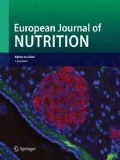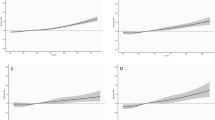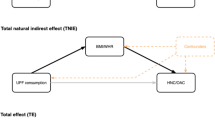Abstract
Background
Tea and coffee are widely consumed beverages. Tea flavonoids have been shown to inhibit lung tumorigenesis using in vitro and in vivo models. Conversely, coffee contains complex mixtures of biochemically active compounds, some of which may have genotoxic and mutagenic properties. However, previous epidemiologic studies have shown inconsistent results on tea and coffee in relation to lung cancer risk.
Methods
The Singapore Chinese Health Study is a population-based prospective cohort of 63,257 Singaporean Chinese men and women, with an average of 17.7 years of follow-up. Information on tea and coffee consumption and other lifestyle factors was collected through in-person interviews at baseline. Multivariable Cox regression models were used to estimate hazard ratios (HRs) and 95% confidence intervals (CIs) for the associations with adjustment for potential confounders.
Results
There were 1486 incident lung cancer cases. Compared to non-daily coffee drinkers, HRs (95% CIs) of lung cancer risk for those consuming one, two, and three or more cups of coffee per day were 1.18 (1.02–1.36), 1.21 (1.05–1.40), and 1.32 (1.08–1.62) respectively (P for trend = 0.0034). The highest category of black tea consumption (at least 2 cups per day) was inversely associated with risk of lung cancer [HR (95% CI) = 0.73 (0.53–0.99)], particularly among men [HR (95% CI) = 0.67 (0.47–0.95)], compared to less-than-weekly black tea drinkers, although the interaction by sex was not statistically significant.
Conclusions
Coffee beverage consumption was associated with higher risk of developing lung cancer. On the other hand, black tea intake was associated with lower risk of lung cancer among men in our cohort, and further studies are needed to confirm this association.
Similar content being viewed by others
References
Nehlig A, Debry G (1994) Potential genotoxic, mutagenic and antimutagenic effects of coffee: a review. Mutat Res 317(2):145–162
Koh WP, Yuan JM, Sun CL, Lee HP, Yu MC (2005) Middle-aged and older Chinese men and women in Singapore who smoke have less healthy diets and lifestyles than nonsmokers. J Nutr 135(10):2473–2477. https://doi.org/10.1093/jn/135.10.2473
Treur JL, Taylor AE, Ware JJ, McMahon G, Hottenga JJ, Baselmans BM, Willemsen G, Boomsma DI, Munafo MR, Vink JM (2016) Associations between smoking and caffeine consumption in two European cohorts. Addiction 111(6):1059–1068. https://doi.org/10.1111/add.13298
Vuong QV (2014) Epidemiological evidence linking tea consumption to human health: a review. Crit Rev Food Sci Nutr 54(4):523–536. https://doi.org/10.1080/10408398.2011.594184
Ferlay J, Soerjomataram I, Dikshit R, Eser S, Mathers C, Rebelo M, Parkin DM, Forman D, Bray F (2015) Cancer incidence and mortality worldwide: sources, methods and major patterns in GLOBOCAN 2012. Int J Cancer 136(5):E359–386. https://doi.org/10.1002/ijc.29210
Steward B, Wild C (2014) World Cancer Report 2014. Lyon
Lam TK, Gallicchio L, Lindsley K, Shiels M, Hammond E, Tao XG, Chen L, Robinson KA, Caulfield LE, Herman JG, Guallar E, Alberg AJ (2009) Cruciferous vegetable consumption and lung cancer risk: a systematic review. Cancer Epidemiol Biomark Prev 18(1):184–195. https://doi.org/10.1158/1055-9965.EPI-08-0710
Yuan JM, Stram DO, Arakawa K, Lee HP, Yu MC (2003) Dietary cryptoxanthin and reduced risk of lung cancer: the Singapore Chinese Health Study. Cancer Epidemiol Biomark Prev 12(9):890–898
Yuan JM, Ross RK, Chu XD, Gao YT, Yu MC (2001) Prediagnostic levels of serum beta-cryptoxanthin and retinol predict smoking-related lung cancer risk in Shanghai, China. Cancer Epidemiol Biomark Prev 10(7):767–773
London SJ, Yuan JM, Chung FL, Gao YT, Coetzee GA, Ross RK, Yu MC (2000) Isothiocyanates, glutathione S-transferase M1 and T1 polymorphisms, and lung-cancer risk: a prospective study of men in Shanghai, China. Lancet 356(9231):724–729. https://doi.org/10.1016/S0140-6736(00)02631-3
Guertin KA, Freedman ND, Loftfield E, Graubard BI, Caporaso NE, Sinha R (2016) Coffee consumption and incidence of lung cancer in the NIH-AARP Diet and Health Study. Int J Epidemiol 45(3):929–939. https://doi.org/10.1093/ije/dyv104
Xie Y, Qin J, Nan G, Huang S, Wang Z, Su Y (2016) Coffee consumption and the risk of lung cancer: an updated meta-analysis of epidemiological studies. Eur J Clin Nutr 70(2):199–206. https://doi.org/10.1038/ejcn.2015.96
Nomura A, Heilbrun LK, Stemmermann GN (1986) Prospective study of coffee consumption and the risk of cancer. J Natl Cancer Inst 76(4):587–590
Stensvold I, Jacobsen BK (1994) Coffee and cancer: a prospective study of 43,000 Norwegian men and women. Cancer Causes Control 5(5):401–408
Bae JM, Li ZM, Shin MH, Kim DH, Lee MS, Ahn YO (2013) Pulmonary tuberculosis and lung cancer risk in current smokers: the Seoul Male Cancer Cohort Study. J Korean Med Sci 28(6):896–900. https://doi.org/10.3346/jkms.2013.28.6.896
Ganesh B, Sushama S, Monika S, Suvarna P (2011) A case–control study of risk factors for lung cancer in Mumbai, India. Asian Pac J Cancer Prev 12(2):357–362
Sanikini H, Radoi L, Menvielle G, Guida F, Mattei F, Cenee S, Cyr D, Sanchez M, Velten M, Carton M, Schmaus A, Luce D, Stucker I (2015) Coffee consumption and risk of lung cancer: the ICARE study. Eur J Epidemiol 30(1):81–85. https://doi.org/10.1007/s10654-014-9976-2
Mettlin C (1989) Milk drinking, other beverage habits, and lung cancer risk. Int J Cancer 43(4):608–612
Takezaki T, Hirose K, Inoue M, Hamajima N, Yatabe Y, Mitsudomi T, Sugiura T, Kuroishi T, Tajima K (2001) Dietary factors and lung cancer risk in Japanese: with special reference to fish consumption and adenocarcinomas. Br J Cancer 84(9):1199–1206. https://doi.org/10.1054/bjoc.2001.1722
Baker JA, McCann SE, Reid ME, Nowell S, Beehler GP, Moysich KB (2005) Associations between black tea and coffee consumption and risk of lung cancer among current and former smokers. Nutr Cancer 52(1):15–21. https://doi.org/10.1207/s15327914nc5201_2
Luqman M, Javed MM, Daud S, Raheem N, Ahmad J, Khan AU (2014) Risk factors for lung cancer in the Pakistani population. Asian Pac J Cancer Prev 15(7):3035–3039
Chiu YL, Wang XR, Qiu H, Yu IT (2010) Risk factors for lung cancer: a case–control study in Hong Kong women. Cancer Causes Control 21(5):777–785. https://doi.org/10.1007/s10552-010-9506-9
Tang N, Wu Y, Ma J, Wang B, Yu R (2010) Coffee consumption and risk of lung cancer: a meta-analysis. Lung Cancer 67(1):17–22. https://doi.org/10.1016/j.lungcan.2009.03.012
Galarraga V, Boffetta P (2016) Coffee drinking and risk of lung cancer—a meta-analysis. Cancer Epidemiol Biomarkers Prev 25(6):951–957. https://doi.org/10.1158/1055-9965.EPI-15-0727
Loomis D, Guyton KZ, Grosse Y, Lauby-Secretan B, El Ghissassi F, Bouvard V, Benbrahim-Tallaa L, Guha N, Mattock H, Straif K, International Agency for Research on Cancer Monograph Working Group (2016) Carcinogenicity of drinking coffee, mate, and very hot beverages. Lancet Oncol 17(7):877–878. https://doi.org/10.1016/s1470-2045(16)30239-x
Lin IH, Ho ML, Chen HY, Lee HS, Huang CC, Chu YH, Lin SY, Deng YR, He YH, Lien YH, Hsu CW, Wong RH (2012) Smoking, green tea consumption, genetic polymorphisms in the insulin-like growth factors and lung cancer risk. PLoS One 7(2):e30951. https://doi.org/10.1371/journal.pone.0030951
Pasquet R, Karp I, Siemiatycki J, Koushik A (2016) The consumption of coffee and black tea and the risk of lung cancer. Ann Epidemiol 26(11):757–763e752. https://doi.org/10.1016/j.annepidem.2016.09.001
Wang L, Zhang X, Liu J, Shen L, Li Z (2014) Tea consumption and lung cancer risk: a meta-analysis of case–control and cohort studies. Nutrition 30(10):1122–1127. https://doi.org/10.1016/j.nut.2014.02.023
Hankin JH, Stram DO, Arakawa K, Park S, Low SH, Lee HP, Yu MC (2001) Singapore Chinese Health Study: development, validation, and calibration of the quantitative food frequency questionnaire. Nutr Cancer 39(2):187–195. https://doi.org/10.1207/S15327914nc392_5
Chei CL, Loh JK, Soh A, Yuan JM, Koh WP (2018) Coffee, tea, caffeine, and risk of hypertension: the Singapore Chinese Health Study. Eur J Nutr 57(4):1333–1342. https://doi.org/10.1007/s00394-017-1412-4
Hastie TJ, Tibshirani RJ (1990) Generalized additive models. Chapman and Hall, New York
Wang A, Wang S, Zhu C, Huang H, Wu L, Wan X, Yang X, Zhang H, Miao R, He L, Sang X, Zhao H (2016) Coffee and cancer risk: a meta-analysis of prospective observational studies. Sci Rep 6:33711. https://doi.org/10.1038/srep33711
Bjorngaard JH, Nordestgaard AT, Taylor AE, Treur JL, Gabrielsen ME, Munafo MR, Nordestgaard BG, Asvold BO, Romundstad P, Davey Smith G (2017) Heavier smoking increases coffee consumption: findings from a Mendelian randomization analysis. Int J Epidemiol 46(6):1958–1967. https://doi.org/10.1093/ije/dyx147
Fu YY, Takezaki T, Tajima K (1997) Risk factors of lung cancer–follow-up studies in Nagoya Japan. Zhonghua Liu Xing Bing Xue Za Zhi 18(6):328–330
Spiller MA (1998) The chemical components of coffee. Caffeine. CRC Press, Boca Raton, pp 97–161
Wang G, Bhoopalan V, Wang D, Wang L, Xu X (2015) The effect of caffeine on cisplatin-induced apoptosis of lung cancer cells. Exp Hematol Oncol 4:5. https://doi.org/10.1186/2162-3619-4-5
Hossain MZ, Gilbert SF, Patel K, Ghosh S, Bhunia AK, Kern SE (2013) Biological clues to potent DNA-damaging activities in food and flavoring. Food Chem Toxicol 55:557–567. https://doi.org/10.1016/j.fct.2013.01.058
Yang CS, Wang X, Lu G, Picinich SC (2009) Cancer prevention by tea: animal studies, molecular mechanisms and human relevance. Nat Rev Cancer 9(6):429–439. https://doi.org/10.1038/nrc2641
Yang CS, Chung JY, Yang GY, Li C, Meng X, Lee MJ (2000) Mechanisms of inhibition of carcinogenesis by tea. BioFactors 13(1–4):73–79
Matarrese P, Colasanti T, Ascione B, Margutti P, Franconi F, Alessandri C, Conti F, Riccieri V, Rosano G, Ortona E, Malorni W (2011) Gender disparity in susceptibility to oxidative stress and apoptosis induced by autoantibodies specific to RLIP76 in vascular cells. Antioxid Redox Signal 15(11):2825–2836. https://doi.org/10.1089/ars.2011.3942
Barp J, Araujo AS, Fernandes TR, Rigatto KV, Llesuy S, Bello-Klein A, Singal P (2002) Myocardial antioxidant and oxidative stress changes due to sex hormones. Braz J Med Biol Res 35(9):1075–1081
Ide T, Tsutsui H, Ohashi N, Hayashidani S, Suematsu N, Tsuchihashi M, Tamai H, Takeshita A (2002) Greater oxidative stress in healthy young men compared with premenopausal women. Arterioscler Thromb Vasc Biol 22(3):438–442
Tang N, Wu Y, Zhou B, Wang B, Yu R (2009) Green tea, black tea consumption and risk of lung cancer: a meta-analysis. Lung Cancer 65(3):274–283. https://doi.org/10.1016/j.lungcan.2008.12.002
Zhong L, Goldberg MS, Gao YT, Hanley JA, Parent ME, Jin F (2001) A population-based case–control study of lung cancer and green tea consumption among women living in Shanghai, China. Epidemiology 12(6):695–700
Wang Y, Yu X, Wu Y, Zhang D (2012) Coffee and tea consumption and risk of lung cancer: a dose–response analysis of observational studies. Lung Cancer 78(2):169–170. https://doi.org/10.1016/j.lungcan.2012.08.009
Al-Awaida W, Akash M, Aburubaiha Z, Talib WH, Shehadeh H (2014) Chinese green tea consumption reduces oxidative stress, inflammation and tissues damage in smoke exposed rats. Iran J Basic Med Sci 17(10):740–746
Babu PV, Sabitha KE, Shyamaladevi CS (2006) Therapeutic effect of green tea extract on oxidative stress in aorta and heart of streptozotocin diabetic rats. Chem Biol Interact 162(2):114–120. https://doi.org/10.1016/j.cbi.2006.04.009
Roomi MW, Ivanov V, Kalinovsky T, Niedzwiecki A, Rath M (2005) In vitro and in vivo antitumorigenic activity of a mixture of lysine, proline, ascorbic acid, and green tea extract on human breast cancer lines MDA-MB-231 and MCF-7. Med Oncol 22(2):129–138. https://doi.org/10.1385/MO:22:2:129
Crespy V, Williamson G (2004) A review of the health effects of green tea catechins in in vivo animal models. J Nutr 134(12 Suppl):3431S–3440S
Wang H, Bian S, Yang CS (2011) Green tea polyphenol EGCG suppresses lung cancer cell growth through upregulating miR-210 expression caused by stabilizing HIF-1alpha. Carcinogenesis 32(12):1881–1889. https://doi.org/10.1093/carcin/bgr218
Cromie MM, Gao W (2015) Epigallocatechin-3-gallate enhances the therapeutic effects of leptomycin B on human lung cancer a549 cells. Oxid Med Cell Longev 2015:217304. https://doi.org/10.1155/2015/217304
Suganuma M, Saha A, Fujiki H (2011) New cancer treatment strategy using combination of green tea catechins and anticancer drugs. Cancer Sci 102(2):317–323. https://doi.org/10.1111/j.1349-7006.2010.01805.x
Acknowledgements
We would like to thank Prof. Mimi C. Yu and Prof. Lee Hin Peng for initiating the Singapore Chinese Health Study and Ms. Siew-Hong Low for supervising the field work of the Singapore Chinese Health Study. We would also like to thank the National Registry of Diseases Office for their assistance in the identification of cancer cases.
Funding
The Singapore Chinese Health Study was supported by R01 CA144034, and UM1 CA182876. W–P Koh is supported by the National Medical Research Council, Singapore (NMRC/CSA/0055/2013).
Author information
Authors and Affiliations
Corresponding author
Ethics declarations
Conflict of interest
On behalf of all authors, the corresponding author states that there is no conflict of interest.
Electronic supplementary material
Below is the link to the electronic supplementary material.
Rights and permissions
About this article
Cite this article
Seow, W.J., Koh, WP., Jin, A. et al. Associations between tea and coffee beverage consumption and the risk of lung cancer in the Singaporean Chinese population. Eur J Nutr 59, 3083–3091 (2020). https://doi.org/10.1007/s00394-019-02146-7
Received:
Accepted:
Published:
Issue Date:
DOI: https://doi.org/10.1007/s00394-019-02146-7




